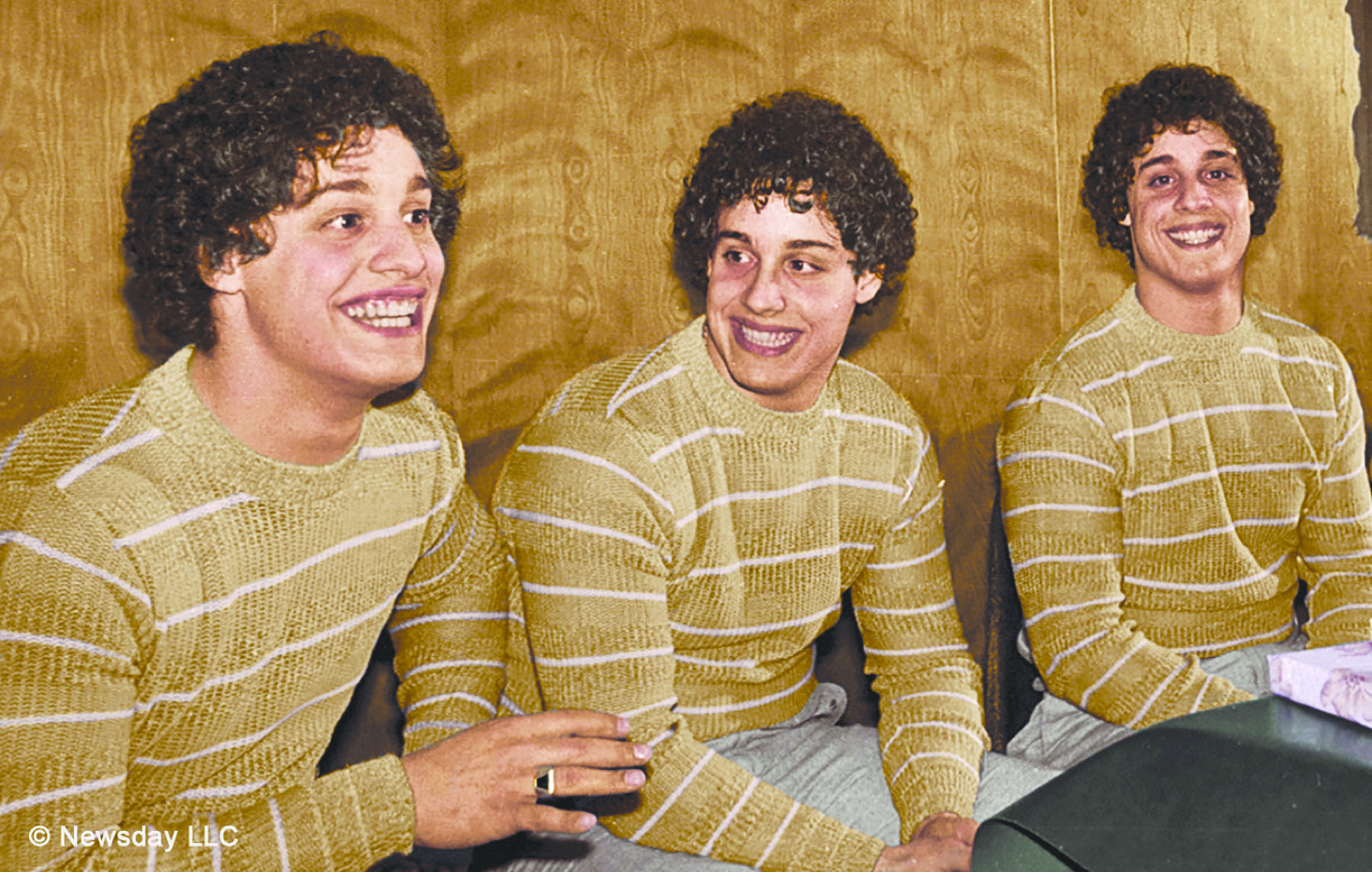
In July 1961, identical Jewish triplets were separated shortly after they were born and adopted by different families. None of the three boys or their adoptive families knew of the others’ existence. Then, 19 years later, Robert Shafran arrived at the same upstate New York community college that Eddy Galland had attended the year before. It didn’t take long for friends to connect the dots, and media around the world reported on the teenagers’ joyful reunion. The frenzy escalated when David Kellman realized he was the third triplet, and the trio became celebrities as their story spread.
But as the documentary “Three Identical Strangers” discloses, what began as a feel-good celebration soon turned sinister amid revelations that the triplets were part of a secret experiment that Louise Wise Services, a Jewish adoption agency, had covered up.
“There were people involved in splitting them up. We set out to explore how that happened and why,” first-time filmmaker Tim Wardle told the Journal.
When Wardle heard the story five years ago, he was drawn to “the compelling human story at the heart,” and the themes of free will versus destiny, nature versus nurture and medical ethics.
The real story is a tragedy.
Eddy Galland, who was manic depressive, committed suicide in 1995. It was the same year the triplets — who for years had been subjected to so-called routine adoptee testing — discovered they had been intentionally separated and placed in families of different socio-economic classes. Their adoptive parents were not told that the boys were part of a research study.
“We were a science experiment,” Kellman says in the film.
It took Wardle time to earn the surviving brothers’ trust and secure their cooperation for the film. “Even then I worried that they wouldn’t show up for interviews or [would] pull out,” Wardle said.
Finding people who were willing to speak on the record about the study was another hurdle. Most of the people associated with the study or Louise Wise Services, which closed in 2003, refused to talk. Although, Wardle managed to interview two psychologists who were peripherally involved.
“When we brought the brothers together for the interview they were wearing the same shoes and they weren’t even talking at the time. There are definitely things that can’t be explained.” — Tim Wardle
“The whole thing is wrapped up in so much secrecy. My producer spent a lot of time going to Jewish archives in New York, sifting through information,” the British director said.
Wardle also discovered that U.S. television networks had made at least three previous attempts to tell the story. Under pressure from Louise Wise Services and Dr. Peter Neubauer, the director of the study, “It was shut down every time,” Wardle said. “It did make us quite paranoid that we might get shut down too.”
Wardle, 39, is not Jewish but he is married to a Jewish woman. He said Jewish audiences have found the documentary very hard to watch. “I’ve had people at screenings who were crying with rage, they were so angry,” he said.
The study was never completed or published, and all records have been
sealed until 2065. However, Kellman and Shafran have obtained heavily redacted photocopies of the portions pertaining to them. “It’s a lot of dense scientific data that was never written up. There’s no conclusion interpreting what it could mean,” Wardle said. “The brothers are looking into legal options.”
Shafran, a lawyer, and Kellman, an insurance salesman, “were not in a good place at all” during filming,” Wardle said. “They weren’t really speaking to each other. The tension you see is very real. I think Eddy dying shattered them, but the film has brought them together.”
Wardle hopes that the film’s release in theaters and its planned broadcast on CNN in January will lead to full transparency around the study.
“I hope it raises questions about medical ethics and things that are done in the name of science and experimentation,” he said. And, he hopes the film gets people “thinking about the nature-versus-nurture question. What makes us who we are? Is it genetics or is it our
family? When we brought the brothers together for the interview, they were both wearing the same shoes and they weren’t even talking at the time. There are definitely things that can’t be explained.”
Wardle expects audiences will “feel a range of emotions: happy at the start of it, sad at the tragic moments and angry at the end. I hope it makes them think about what family is,” he said.
“Is family what you make it or is biology more important? I think it’s the former, and love can overcome anything.”
“Three Identical Strangers” opens in theaters on June 29.






















 More news and opinions than at a Shabbat dinner, right in your inbox.
More news and opinions than at a Shabbat dinner, right in your inbox.